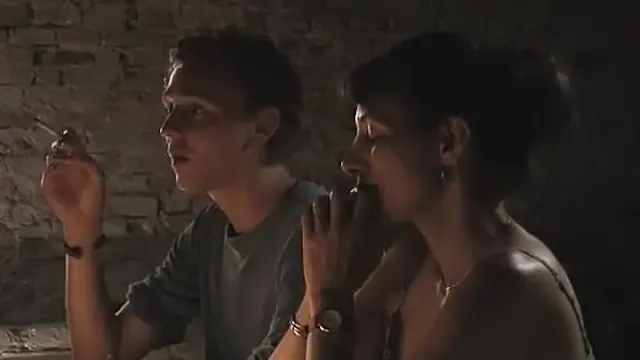Archipelago (Joanna Hogg, 2010)
Cast: Kate Fahy, Tom Hiddleston, Lydia Leonard, Amy Lloyd, Christopher Baker, Andrew Lawson, Mike Pender.
Screenplay: Joanna Hogg.
Cinematography: Ed Rutherford.
Production design: Stéphane Collonge.
Film editing: Helle le Fevre.
Rose (Amy Lloyd), a pretty young woman who has been hired to cook and clean for the Leighton family, is explaining to Edward (Tom Hiddleston) what she thinks is the humane way to cook a lobster. Don't plunge it directly into fully boiling water but instead put it in warm water and let the temperature slowly rise. The lobster will grow comatose and die in its sleep, she says. Sometimes, however, lobsters do struggle and try to get out of the pot, even knocking off the lid. I think there are audiences who may respond to Joanna Hogg's
Archipelago like the lobsters: either drift off to sleep or decide to make an exit. For my part, I think it better to stay with it and behold the artistry with which Hogg steeps us in the building tensions of the family: mother Patricia (Kate Fahy), daughter Cynthia (Lydia Leonard), and son Edward. There's a father, too, but he is absent, and although he is expected to join them, there's a good deal of doubt about whether he will. They have leased a vacation home on one of the Isles of Scilly, an archipelago off the coast of Cornwall. Rocky, isolated, sparsely populated, but picturesque, the island, which the Leightons have visited before, has been chosen for a farewell celebration. Edward is about to go off to Africa to work as a health educator in an attempt to control the spread of AIDS, but it's soon apparent that there are tensions in the family over this altruistic decision -- and about many other things. Edward bears the brunt of most of the criticism, which comes largely from his sister, a bundle of nerves who likes to be in control at all times. We sense the tension between brother and sister from almost the beginning of the film, when Cynthia, who has arrived with her mother before Edward, offers a bit grudgingly to give up to Edward the bedroom she has already spent one night in and to move into one of the more cramped servant's rooms in the attic. Edward, not wanting to contest the issue, chooses the small, angular room, but the back-and-forthing among brother, sister, and mother foreshadows more power games to come. Like the master director she admires, Yasujiro Ozu, Hogg beautifully uses the setting, particularly the house, to heighten the emotions on display, even to the way a door is hung: The door to Cynthia's bedroom opens into the room, rather than against the wall, so that anyone entering has to sidle into Cynthia's presence, almost submissively. There is no door between the dining room and the kitchen, so when the family wants to discuss Edward's desire to ask Rose to dine with them, which Cynthia thinks inappropriate, they talk in hushed, tense, and nervous tones. Edward's rapport with Rose, to whom he often escapes from family tension, brings suspicion on him, even though he has a steady girlfriend back in London. Meanwhile, Patricia and Cynthia have a rapport with Christopher, an artist staying on the island who is giving them art lessons. It's a slow, talky film, not sweetened by a background music score, but it has a way of working itself into your brain with more emotional impact than films that pull out all the stops. The title, I think, is telling: Not only does it refer to where the film is set, but it also reminds us that while the islands in an archipelago are separate and distinct, they are geologically related and connected. No member of the Leighton family is an island entire of itself, though she or he may want to be.

























